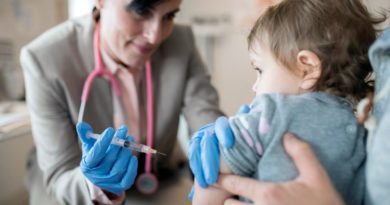UNLV team meets vaccine hesitancy where it breeds: On social media

Sunday, May 25, 2025 | 2 a.m.
Editor’s note: Este artículo está traducido al español.
When Joanna Joseph’s parents immigrated to Nevada, they faced challenges including learning English, finding employment and understanding Nevada’s immunization system for their three children.
Joseph’s parents came from Lebanon and Sierra Leone, where vaccines were required but not readily available. In the U.S., her mother became interested in the public health system but struggled with vaccine requirements due to language barriers.
Today, Joseph draws on her mother’s experiences to help Nevada parents understand vaccination requirements and address vaccine hesitancy concerns through her work at UNLV.
“Vaccine hesitancy is not just about the reluctance of maybe not agreeing with the vaccines or the messaging behind the vaccines, but it’s knowing where to go, how to access those vaccines and then who to ask the right questions to,” said Joseph, a second-year master’s student in public health with an emphasis on epidemiology and biostatistics. “I think that’s why it’s so important with everything that’s going on right now that we are there and we’re visible and we provide families with clear-cut information and cut out all the noise that’s been going on and just present the facts.”
The Vaccine Confidence and Demand Improvement Project launched in January through Centers for Disease Control and Prevention funding to UNLV’s School of Public Health’s Department of Epidemiology and Biostatistics.
This collaboration between UNLV and Nevada’s Division of Public and Behavioral Health aims to reduce vaccine hesitancy among Nevada parents through social media campaigns.
Dr. Brian Labus, a school of public health professor and infectious disease epidemiologist, leads a diverse team of students, alumni and faculty with expertise in infectious diseases, public health messaging and social media communication.
The team focused on social media outreach to counter online misinformation and connect with parents by creating Instagram, Facebook and YouTube profiles in early April that shared graphics and informational videos that have been impactful, lead researcher Divine Abbasszadeh said.
Analytics show the content reaching thousands of viewers, including unexpected audiences in the United Kingdom and Australia, though their primary goal remains addressing Nevada’s low childhood vaccination rates.
The project has enlisted community partners statewide, with Dr. Christina Madison from the Public Health Pharmacist consulting firm regularly appearing in videos to answer vaccine-related questions.
“I do believe a lot of this does come from the misinformation that is spread so easily online, which is why our project is so important, because social media is right at our fingertips,” said Abbasszadeh, a UNLV graduate with a master’s in public health and concentration in epidemiology and biostatistics. “Everyone does have access to it — in comparison to how some people may not have access to medical education or resources to learn about those things — so that’s why we’re here on social media, to try and dismantle that.”
Low rate of vaccination
In Clark County, only 64% of children under age 3 have completed their recommended seven-series vaccination schedule, according to the Southern Nevada Health District.
Nevada ranks among the lowest states for childhood vaccination rates, Labus added.
This vaccination series includes: DTaP (diphtheria, tetanus and acellular pertussis), IPV (inactivated poliovirus), MMR (measles, mumps and rubella), hepatitis A and B, PCV13 (pneumococcal conjugate), chickenpox, rotavirus, and Hib (haemophilus influenza type b).
From 2023 to 2024, there has been a more than 2% decrease in children under age 3 who are up to date on their seven-series vaccination, the health district reported.
It emphasized that on-time vaccination is crucial for protecting against potentially life-threatening diseases, with the CDC and American Academy of Pediatrics recommending children maintain their well-child appointments and routine immunizations.
The Advisory Committee on Immunization Practices recommends vaccination against 14 potentially serious illnesses during a child’s first two years, with many required later for school enrollment.
As of last August, over 70,000 students in the Clark County School District (out of approximately 304,565) had medical or religious vaccine exemptions, with 9,437 exemptions specifically for the measles vaccine.
Measles has become concerning, as an outbreak originating in an undervaccinated Texas Mennonite community in January had led to 884 confirmed cases across 30 jurisdictions by April 24, including in nearby California, Colorado and New Mexico. Three deaths have occurred — two children in Texas and one adult in New Mexico.
The majority of measles cases are affecting children and teens aged 5-19. This represents a significant increase from 285 cases in 2024 and just 59 cases in 2023.
Labus said people aren’t afraid of diseases such as measles because public health agencies “did such a good job” of getting rid of them. But because many adults don’t have experiences with these diseases, some might lack the drive to get their kids vaccinated.
But if people stop vaccinating their children for preventable diseases, they’re bound to come back, as seen in Texas.
Though the project is set to close in June, Labus plans to continue this sort of work. He said funding for vaccination programs has always been a challenge, and it’s important to spread this information so children don’t get sick — or die — from preventable diseases.
“We struggle with immunization in Nevada, and if there aren’t many people supporting it, those voices that spread misinformation get louder. We don’t want infectious diseases that we haven’t seen in decades to become a reality,” Labus said. “This is an important project to try and convince people that immunizations are safe and effective, and the best way to protect their kids against some really horrible diseases that we only read about in textbooks.”
For information more on the project, go to vaxfactsnv.sites.unlv.edu.
grace.darocha@gmg vegas.com / 702-948-7854 / @gracedarocha


